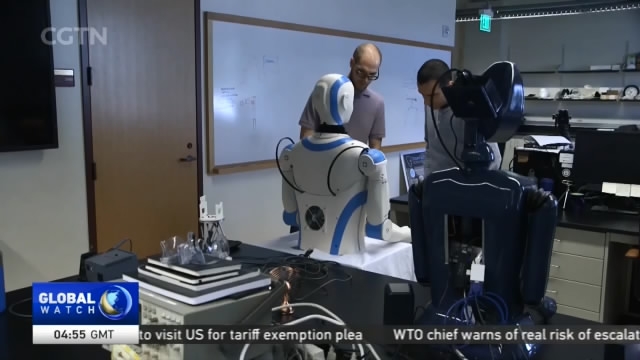
15:04, 06-Mar-2018
Robot Roommate: With AI & emotional recognition, robots become companions

Robots are playing a growing role in our lives. They're a common sight in factories, and they're taking over some of the tedious housekeeping chores at home. Now they're moving beyond the drudgery. As CGTN's Hendrik Sybrandy reports, companion robots for senior citizens may be the next big thing.
Anna Fine lives alone in Denver, Colorado. Well, not counting her cat and a recent addition to her life, this robot.
ANNA FINE KAVOD SENIOR LIFE RESIDENT "I thought it was intriguing and something I might want to try."
The robot, whose name is Ryan, plays music and interacts with Anna.
"I can ask him questions, and he talks back to me." "The cat wasn't scared at all."
Ryan is a product of this robotics laboratory at the University of Denver. Here, using artificial intelligence and emotional recognition algorithms, they've created social robots.
MOHAMMAD MAHOOR UNIVERSITY OF DENVER "Social robot is a robot that connects to you and supports you socially and emotionally."
Associate Professor of Computer Engineering Mohammad Mahoor and his students developed these machines as a way to help often lonely senior citizens, including those suffering from depression and Alzheimer's Disease. They've done several pilot studies already. He says the results are good so far.
MOHAMMAD MAHOOR UNIVERSITY OF DENVER "We gave every subject a robot, so it was like a friend, a companion that stayed in the room, and they really loved interacting with the robot."
The robots come with cognitive games to keep the human brain active. They're programmed to offer reminders. And they can read people's emotions through their facial expressions and mimic them.
HOWARD FENG GRADUATE STUDENT "The robot can just talk to you, respond to whatever topic you would like to talk to."
Ryan even tells jokes.
"A termite walks into a pub and says is the bartender here."
HENDRIK SYBRANDY DENVER "Mahoor believes there's a real need for companion robots like Ryan. The U.S. Bureau of Labor Statistics estimates more than a million additional caregivers will be needed to care for elderly Americans in the next five years."
While no substitute for humans.
"Absolutely not."
Mahoor says social robots, which have now sprouted functioning arms, are good at performing repetitive tasks. The concept has been popularized in the T.V. show "Humans." The PARO Therapeutic animal robot has been extensively used in Japan. Mahoor predicts his robots will be available on a subscription basis and be commercialized soon.
MOHAMMAD MAHOOR UNIVERSITY OF DENVER "I believe that these robots are going to be everywhere in assisted living facilities, in senior living facilities."
Anna Fine never expected to share a room with a robot but is giving it a whirl.
"This will be an interesting experiment." "We'll see how it goes."
Hendrik Sybrandy, CGTN, Denver.

SITEMAP
Copyright © 2018 CGTN. Beijing ICP prepared NO.16065310-3
Copyright © 2018 CGTN. Beijing ICP prepared NO.16065310-3